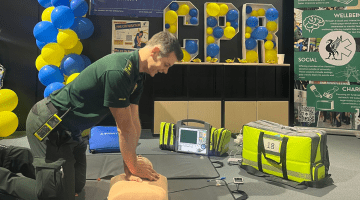About this course
This MA Nursing programme for Registered Nurses provides an exciting opportunity for you to broaden your nursing knowledge by developing critical thinking in the context of the policy and practices that inform nursing.
- This programme is for Registered Nurses
- Build your knowledge of current nursing practices and the theory of nursing
- Study part-time or full-time
- Positively influence patient care
The MA Nursing programme offers progressive, practice-focused learning and development within a constantly evolving clinical world.
You will enjoy high quality teaching in a modern and developing faculty. The combination of core, optional and research modules creates an environment in which you will be supported to develop your thinking and knowledge, with the aim of enhancing patient care through nursing education and research.
The programme team have a depth and breadth of clinical and academic knowledge designed to ensure you are supported in developing both personally and professionally.
Our Schools city centre location is undergoing a major renovation, which will incorporate the use of brand new simulation suites and equipment to ensure that your learning environment is as unique as the educational journey you will embark upon.
We also offer an MA Nursing Mental Health course which may be of interest to you.
Course modules
Discover the building blocks of your programme
There are four compulsory Core modules totalling 110 credits.
The remaining credits are made up of your choice of Optional modules which can be tailored to your personal interest (to a total of 180 credits for the MA).
International applicants: Please note that as an international student you would not eligible to select modules which have assessments based in practice and instead will complete theoretical modules.
Further guidance on modules
Modules are designated core or optional in accordance with professional body requirements, as applicable, and LJMU’s Academic Framework Regulations. Whilst you are required to study core modules, optional modules provide you with an element of choice. Their availability may vary and will be subject to meeting minimum student numbers.
Where changes to modules are necessary these will be communicated as appropriate.
Core modules
Advancing Leadership for Quality
20 credits
20 credits
Through active learning this module will enhance your leadership skills and to work effectively in a team.
Research Methodology, Methods and Data Analysis
30 credits
30 credits
This module aims to develop your research skills in the field of health and social care practice. It also enables you to systematically evaluate research outcomes from a variety of sources. The module:
- provides a critical knowledge base of the philosophical foundations of health and social research
- enables you to develop expertise in qualitative and quantitative data analysis
- enables you to carry out empirical and literature-based research
Dissertation
60 credits
60 credits
The dissertation module offers the student the opportunity to explore in-depth an area of personal or professional interest that relates to their programme of study. In doing this, facilitated support and guidance will be offered to enable the learner to expand their research knowledge, skills and personal effectiveness and apply what has been learned in previous modules to the development of their own research/quality improvement project.
Optional Modules
Ethical and Legal Issues Within Advanced Practice
10 credits
10 credits
Aimed at those working as registered professionals in a relevant area of practice, this module will build your skills in advanced practice decision making. It will also raise your appreciation of the ethical and legal responsibilities involved in advanced practice decision making.
Adult Congenital Heart Disease: Care of the patient through their lifespan
20 credits
20 credits
This module focuses on developing a critical understanding of congenital heart disease in adults, including its origins, presentation, and impact, and addresses specific care requirements. Topics covered include cardiovascular anatomy, pathophysiology, management, long-term effects, healthcare implications, patient perspectives, and ethical issues.
Advancing the Critical Care Practitioner
30 credits
30 credits
This is a Core module on the Critical Care route only. It is also available as an Option module on the Clinical route.
This programme has a practice assessment document that has a pass/fail element that will be part of the assessment component.
Violence
10 credits
10 credits
This module critically examines a range of key issues relating to violence and health from international, national and local perspectives. It demonstrates the need for an interdisciplinary public health approach when addressing the causes of violence, building prevention control strategies, and promoting safety. It enables you to understand and develop strategies to control violence.
Understanding Addictions
20 credits
20 credits
This module enhances your knowledge and understanding of addiction as a public health issue and also its risk factors. It assesses different models of addiction e.g. drug addiction, alcohol addiction, gambling etc as well as its associations and mediators/moderators.
Addictions: Policy and Interventions
20 credits
20 credits
This module enhances your knowledge and understanding of addictions policy objectives, enabling you to critically assess the effectiveness of the interventions. It enables you to:
- identify core addiction policies and strategies from a UK and international perspective and assess how these are developed and put into operation
- examine how personal and structural forces impact on addiction and assess if these are related to policy objectives
- evaluate policies and interventions designed to improve addiction outcomes
Negotiated Work Based Learning
20 credits
20 credits
This module focuses on putting your theoretical learning into practical use.
Collaborative and Professional Practice in Dementia Care
30 credits
30 credits
The aim of this module is to develop your understanding of dementia. It helps you to think creatively, identify innovations in care delivery, how these can be adapted and applied to the service planning and delivery within your own organisation.
Professional Practice in Palliative Care
30 credits
30 credits
The aim of this module is to enhance knowledge of palliative care practice, promoting high quality care for all those approaching the end of their lives, whatever their condition and whatever their setting.
Safeguarding in Multi-professional Practice
30 credits
30 credits
The aim of this module is to enhance the management and implementation of safeguarding policies within a range of care settings and client groups.
Independent and Supplementary Prescribing
20 credits
20 credits
Aimed at healthcare professionals registered with the HCPC & NMC, this module enables you to prescribe, safely, appropriately and cost-effectively as independent and/or supplementary prescribers, in accordance with both legal and professional requirements.
The module will prepare you to:
- complete an assessment of a patient/client/service users whilst developing a management plan in relation to their diagnosis/differential diagnosis.
- complete an episode of care through prescribing or deprescribing safety
All students who wish to undertake Independent & Supplementary Prescribing also known as V300 Non-Medical Prescribing will have to complete an additional 'North West Non-Medical Prescribing Application form' which will be approved by the prescribing programme team prior to commencement on the independent and supplementary prescribing programme.
Fundamentals of coaching for developing health and social care practice
20 credits
20 credits
This module will help you to:
- develop a critical understanding of the underlying fundamental theory and principles of coaching within Health and Social Care
- demonstrate a critically reflexive approach to synthesising coaching theory and principles within the context of practice.
Teaching, learning and assessment in practice
20 credits
20 credits
This module is designed to enable registered health professionals from a wide range of settings to develop their approaches in advancing teaching learning and assessment in practice.
It will also help you to develop a critically reflective approach to your own development in the application of teaching and learning theory, and apply this to your own practice.
Engaging in Children and Young People’s Complex Mental Health
20 credits
20 credits
This module offers a multi-disciplinary perspective on children and young people's mental health, covering child development, prevention, early intervention, various disorders, communication, and resilience.
The Self in Mental Health
20 credits
20 credits
This module aims to critically explore the concept of the self within a mental health context. It is assessed via a referenced script or your journey of development and oral presentation to support this. The focus is on the different aspects of the self; the responsible self relates to society and culture, the development of self relates to the psychological and emotional aspects of self, the potential self relates to coaching, and the reasoned self ethical reasoning and decision-making. You will explore the self as personality, as a belief system, as a relational dynamic and therapeutic model to personal and professional practice - Peplau, Watson, Barker, Berne, and Heron. There will also be a focus on self-awareness as self-discovery and the use of self in the talking therapies encompassing critical reflection, emotional intelligence, self resilience, skills in relation to mindfulness, compassion-based approaches, advocacy and applying a right based approach.
The Creation of Mental Illness
30 credits
30 credits
This 30 credit module aims to develop a critical understanding of the historical and socio-cultural framework and perceptions of mental health illness. It is assessed via a poster presentation supported by a written critical analysis. The focus of the module is on the portrayal of mental illness through a variety of mediums. This includes the exploration of society's relationship with mental illness across time, the portrayal of mental illness through art, film, and media and the philosophical development of psychiatry and mental illness.
Your Learning Experience
An insight into teaching on your course
Study hours
This part-time course has a strong emphasis on self-guided study. A 20-credit module, for example, may involve 30 hours of timetabled study over a 15-week period, supported up by significant independent study focused on virtual learning resources and allocated tasks.
Teaching methods
To maintain our professional relevance and enable you to forge key contacts for the future, we work with local stakeholders.
Some of our health contacts include Mersey Care NHS Foundation Trust, St Helens and Knowsley Hospitals NHS Trust, Royal Liverpool and Broadgreen University Hospitals NHS Trust.
Applied learning
MA Nursing offers a blended learning approach with staff always looking for new and engaging ways to develop your knowledge and skills in your chosen pathway.
You will learn via key note lectures, case scenarios, workshops, discussions and clinical development days.
LJMU's virtual learning environment further enhances the learning experience and the use of wikis and group blog videos have received very positive feedback from students across the school. All course lectures and materials are available online.
How learning is monitored on your programme
To cater for the wide-ranging content of our courses and the varied learning preferences of our students, we offer a range of assessment methods on each programme.
The programme's assessment strategy features a wide range of methods to ensure that you are able to demonstrate your skills and knowledge. Assessment tasks are designed to enable you to develop skills and encourages robust feedback processes from peers and academics alike.
There are also opportunities for diagnostic assessment to enable you to anticipate, identify and action plan around your specific developmental needs.
This approach ensures that assessment tasks are relevant and meaningful to you and your work and offer appropriate preparation for development.
There is a strong reliance on methods that relate to reflexivity, evidence-based practice and consideration of 'real-world' practice.
Where you will study
What you can expect from your School
Situated in the City Campus, the School of Nursing and Allied Health works with a wide range of health and social care organisations to design, deliver and evaluate a dynamic suite of postgraduate programmes. In addition to specialist facilities, you will find high quality meeting and seminar rooms and lecture theatres, the Avril Robarts Library which is open 24/7 during semesters plus a large cafe, IT facilities and social spaces.
LJMU's excellent educational and professional training facilities include 1.6 million practice suites which show a patient's journey from the home environment through to rehabilitation. We use the latest clinical equipment for simulations and developing clinical skills in child, adult and mental health nursing, paramedic practice, social work and midwifery. We also have purpose-built, soundproof booths with video camera and playback facilities.
Course tutors

Mark Woods
- Programme Leader
I love to see students develop and evolve as they progress through a module or programme. To watch the pieces of the jigsaw come together for them is why I love my job. To be a small part of people's development and journey is such an honour.
I love to see students develop and evolve as they progress through a module or programme. To watch the pieces of the jigsaw come together for them is why I love my job. To be a small part of people's development and journey is such an honour.
Daniel is the programme leader for MA Nursing and MA Nursing Mental Health at LJMU. He qualified with a HE Diploma in Nursing in 2009, working as a staff nurse for six years in various roles including in SAU, Vascular, GI, Orthopaedics, and in Critical Care. In 2013, he completed a BSc in Professional Practice, working as a practice education facilitator and then as an advanced clinical practitioner before gaining a MSc in Advance Practice in 2017. He moved into academia in 2020, working as a Senior Lecturer in Pre-Registration Nursing and then as a Senior Lecturer in Advanced Practice. His research interests include Advanced Practice, Non-Medical Prescribing, Palliative Care, and Critical Care. His aim is to develop the profile of Advanced Practice within his research and to combine Advanced Practice with the interests previously listed. Daniels varied work and educational background has allowed him to develop a well-rounded understanding of many specialties and to refine his skills as a communicator and team player. He is currently completing a Postgraduate Certificate in Education and has plans to eventually undertake a Professional Doctorate.
-
 Lecturer/ Senior Lecturer
Lecturer/ Senior Lecturer -

-

Career paths
Further your career prospects
LJMU has an excellent employability record with 96% (HESA 2018) of our postgraduates in work or further study six months after graduation. Our applied learning techniques and strong industry connections ensure our students are fully prepared for the workplace on graduation and understand how to apply their knowledge in a real world context.
As a Registered Nurse working within your chosen field of expertise, you may already be in full-time employment. Postgraduate study is used by some students to open up career progression opportunities. For others, its as an opportunity to up-skill in a different specialism, and for many, it meets the critical need to maintain up to date knowledge.
As a degree profession, nursing sees the added value that research, learning and academic study can have on the patient journey, quality of care and of course nurses personal and professional development.
Key to this is lifelong learning strongly supported by the regulatory body the Nursing and Midwifery Council through the revalidation requirement.
Tuition fees and funding
- Home part-time per credit:
- £45
The University reserves the right to increase tuition fees in accordance with any changes to the maximum allowable fees set by the UK Parliament. In the event of such a change, any fee increase will be subject to a maximum cap of 10% of the total course cost as originally stated at the time of your offer.
Fees
The fees quoted at the top of this page cover registration, tuition, supervision, assessment and examinations as well as:
- library membership with access to printed, multimedia and digital resources
- access to programme-appropriate software
- library and student IT support
- free on-campus wifi via eduroam
Additional costs
Although not all of the following are compulsory/relevant, you should keep in mind the costs of:
- accommodation and living expenditure
- books (should you wish to have your own copies)
- printing, photocopying and stationery
- PC/laptop (should you prefer to purchase your own for independent study and online learning activities)
- mobile phone/tablet (to access online services)
- field trips (travel and activity costs)
- placements (travel expenses and living costs)
- student visas (international students only)
- study abroad opportunities (travel costs, accommodation, visas and immunisations)
- academic conferences (travel costs)
- professional-body membership
- graduation (gown hire etc)
Funding
There are many ways to fund postgraduate study for home and international students. From loans to International Scholarships and subject-specific funding, you’ll find all of the information you need on our specialist postgraduate funding pages.
Please be aware that the UK’s departure from the EU may affect your tuition fees. Learn more about your fee status and which tuition fees are relevant to you.
Funding Part-time Study
Unfortunately, due to its three year duration, the part-time version of the programme is not eligible for Student Loans Company funding support.
Entry requirements
You will need:
Qualification requirements
Undergraduate degree
- A minimum 2:1 honours degree in a related subject
Alternative qualifications considered
- UK applicants with NMC registration
Further information
-
Extra Requirements
- You must include a Personal Statement, including two references
- Evidence of Level 6 or Level 7 study
- Ideal for students wishing to undertake further academic studies (such as a PhD)
International requirements
IELTS
- Where English is not a first language, an IELTS score of 7 must be achieved. A minimum score of 7.0 is required within all components
Other international requirements
- International applicants must have nurse registration in their home country
How to apply
Securing your place at LJMU
To apply for this programme, you are required to complete an LJMU online application form. You will need to provide details of previous qualifications and a personal statement outlining why you wish to study this programme.
You can apply now for the MA Nursing course via the LJMU online application form.
You should complete the form thoroughly and provide a detailed personal statement which reflects your suitability and aptitude for the programme.
Your university life
From accommodation and academic support to clubs and societies. Find out what LJMU has to offer.
Related Links
Talk to our students
Connect with a current LJMU student for advice and guidance on university life, courses and more.
See what our students are saying
At LJMU we want you to know you’re making the right choice by studying with us. You can see what our students are saying about their experience with us through their reviews on the following websites:
Related Links
News and views
Browse through the latest news and stories from the university

.png)








The University reserves the right to withdraw or make alterations to a course and facilities if necessary; this may be because such changes are deemed to be beneficial to students, are minor in nature and unlikely to impact negatively upon students or become necessary due to circumstances beyond the control of the University. Where this does happen, the University operates a policy of consultation, advice and support to all enrolled students affected by the proposed change to their course or module.
















